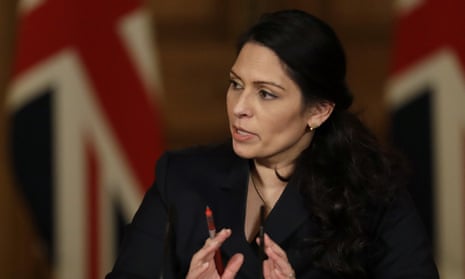What if you started a war and nobody came? It’s over half a century since that question, posed by the mother of an activist jailed for resisting the draft, became a rallying cry for the peace movement during the Vietnam war. But lately the idea of refusing to go along with someone else’s aggressive agenda has started to take on a rather different meaning in British politics. What if a government with little else to offer angry voters tried to start a culture war, only to find itself having a fight in an empty room?
Downing Street’s enthusiasm for getting some – arguably any – kind of “war on the woke” going in time to motivate the troops for this spring’s local and mayoral elections is all too clear. First out of the traps was the communities secretary, Robert Jenrick, seizing on a brief lull in pandemic news last month to announce a minor tweak in planning rules dressed up as a crusade to stop historical statues being taken down if they cause contemporary offence. Now the education secretary, Gavin Williamson, who you might have vaguely imagined would be devoting every waking minute to organising the reopening of schools in three weeks’ time, promises a “free speech champion” to fight back against the no-platforming of speakers on ideological grounds in British universities.
At the weekend we were told in the Sunday Telegraph that the culture secretary, Oliver Dowden, would instruct heritage bodies and museums to “defend our culture and history from the noisy minority of activists constantly trying to do Britain down”, presumably by dragging all the darker aspects of that history out into the light. This briefing seems to have come as something of a surprise to the culture department, which suggested that Dowden’s meeting with cultural institutions to discuss “retain and explain” – its strategy of getting museums to keep artefacts connected to slavery or the legacy of empire on show, but put them into a modern context by explaining the debates behind them – might be rather less confrontational than it was made to sound. But just in case anyone failed to get the overall message, the home secretary, Priti Patel, declared she had found the Black Lives Matter protests that erupted in Britain last summer “dreadful”.
These attempts to breathe new life into suspiciously old fights aren’t merely about telling the Tory base what it wants to hear, or distracting Tory backbenchers restless about the lifting of lockdown, although they usefully serve both purposes. They’re also about trying to dictate the terms on which normal domestic politics might resume, as the pandemic begins to recede.
The last thing Keir Starmer wants ahead of May’s elections is a culture war, dragging him back into the damned-if-you-do, damned-if-you-don’t position of last summer, when there was no conceivable stance on taking the knee or pushing statues into Bristol harbour that could possibly please both millennial Labour voters at ease with contemporary identity politics and older, more socially conservative voters thoroughly exasperated by it. So a culture war is, if the government has anything to do with it, logically what he will get. Half the point of these otherwise empty stunts is to troll Labour into saying whether it supports them or not, knowing that will divide the party regardless of which side it picks.
So far, Starmer’s response has been to refuse to rise to the bait, and seek instead to push the economic arguments that in turn divide the Tory party. It’s a sensible strategy, recognising that the collapse of the so-called “red wall” in 2019 has left both parties struggling to hold together highly volatile electoral coalitions. If Starmer’s worst nightmare is being forced to take sides in arguments over whether Winston Churchill was a racist, then Boris Johnson’s would be any plan to “level up” the north that leaves his party’s wealthy southern base feeling levelled down in order to pay for it.
The risk for Labour is that there comes a point when the refusal to say something, to rise to the defence of cherished liberal causes under attack, becomes a statement in itself. It can afford to be a conscientious objector in the culture wars only if it has demonstrably bigger battles to fight. Fortunately, this spring that shouldn’t be hard.
The problem isn’t that there are no concerns about free speech on campus or the limits of political protest. It’s that there are a million concerns that had to be parked while the country fought off a pandemic, and that the government could finally start dealing with now the success of the vaccine rollout has given it some breathing space. Picking a fight with the National Trust simply isn’t top of most people’s lists, so Labour’s message to the government should be that fake outrage is no substitute for action.
Save the creative industries now hanging by a thread, after months in which cinemas and theatres and comedy clubs and music festivals sadly had to be mothballed, and then by all means get back to us about what visitors should learn on trips round stately homes. Give us a plan for students stuck at home paying £9,000 a year to watch lectures from their bedrooms while universities struggle to plug the black hole caused by unpaid student rent, and then let’s worry about who sits on the panel for all the speaker meetings that aren’t happening anyway thanks to lockdown. Unravel the damage done to trade by Brexit, and then absolutely let’s look at planning guidelines for statues. But don’t start a culture war in lieu of having any better ideas. Or if you do, don’t be surprised if nobody turns up.
Gaby Hinsliff is a Guardian columnist

